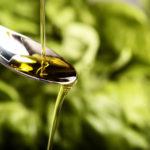Does Vegetable Oil Cause Inflammation?
Which vegetable oils are worse for health?
Andrew Weil, M.D. | October 11, 2022

It can — but it depends on what you consider vegetable oil. Vegetable oils are cooking oils derived from plants — from seeds, nuts, grains, or fruits. Many of them can trigger or contribute to inflammatory processes in the body.
It’s important to remember that inflammation isn’t all bad: Your body needs this process when it’s fighting infection or healing from injury, for example. But when inflammation becomes chronic and serves no purpose, it may set the stage for health problems, including cardiovascular disease, diabetes, and cancer.
Common vegetable oils include sunflower, safflower, corn, and soybean oil. These seed oils are bad for your health. They are major dietary sources of linoleic acid, a polyunsaturated omega-6 fatty acid. While small amounts of omega-6 fats are necessary for optimal health, too much of them can contribute to inflammation. If you’re consuming more pro-inflammatory omega-6 fats than anti-inflammatory omega-3 fats, you are likely to develop chronic, systemic inflammation. Consumption of refined soybean oil in particular, one of the most widely used seed oils in processed food, has been associated with elevations in C-reactive protein, TNF-alpha, and interleukin-6 — all signs of systemic inflammation.
Compared to other types of fats, like the monounsaturated ones found in olives and avocados, the polyunsaturated omega-6 fat in seed oils oxidizes easily, especially when heated to high temperatures. This leads to an increase in free radicals, which can damage the body and also contribute to the risk of chronic conditions.
For these reasons, I have long advised against using sunflower, safflower, corn, and soybean oils. If you’re in search of a vegetable oil with neutral-to-beneficial health effects, particularly for healthy aging, I recommend extra-virgin olive oil. It’s high in monounsaturated fat and low in linoleic acid, and research also indicates its anti-inflammatory properties. Additionally, consider avocado oil and the newly available cultured oil, derived from fermented cultures of micro-organisms, as healthy alternatives and to promote healthy-aging.
Andrew Weil, M.D.
Source
Gunnars K. “Are vegetable and seed oils bad for your health?” Healthline.com, December 12, 2019. https://www.healthline.com/nutrition/are-vegetable-and-seed-oils-bad












